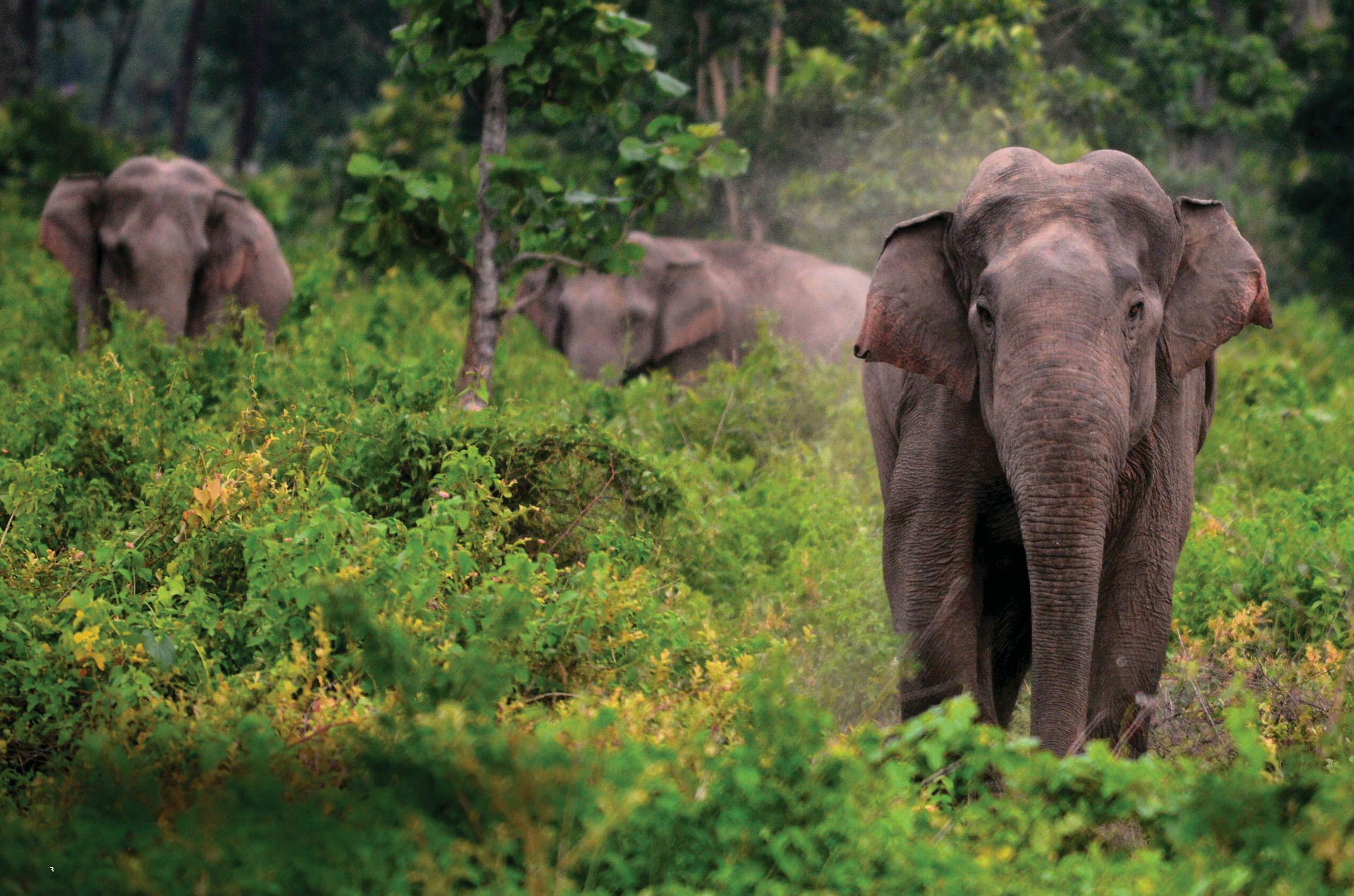يحاول ذهب - حر
UNDER PRESSURE
October 2023
|BBC Wildlife
As India's human population continues to grow and natural habitats become depleted, space for the country's elephants is at a premium

ELEPHANTS ARE valued more in India than all other animals put together," says Anish Andheria, CEO of Wildlife Conservation Trust. "Lord Ganesha, the most worshipped and revered Hindu God, is half-human and half-elephant."
Sadly, revered status isn't keeping these animals safe. Elephants were declared the National Heritage Animal of India in 2010 and granted Schedule 1 status - the highest protection level in the country, on a par with tigers. But elephants and people are frequently coming into contact, leading to horrific flashpoints of violence in which both are losing their lives. "Around 1,400 human and 300 elephant casualties occurred in India due to human-elephant conflict between 2018 and 2020," Andheria explains, the figure not including captive elephants.

Asian elephants (Elephas maximus) are listed as Endangered on the IUCN's Red List. Their numbers have declined by at least 50 per cent over the past three generations, largely due to habitat loss.
India is currently home to about 27,000 elephants, found in 17 states, including Arunachal Pradesh, Uttar Pradesh and West Bengal. While conflict between elephants and people is often associated with the African species, and more attention in India is paid to issues around tigers, leopards and other big cats, human-elephant conflict (HEC) is at crisis levels in the country.

هذه القصة من طبعة October 2023 من BBC Wildlife.
اشترك في Magzter GOLD للوصول إلى آلاف القصص المتميزة المنسقة، وأكثر من 9000 مجلة وصحيفة.
هل أنت مشترك بالفعل؟ تسجيل الدخول
المزيد من القصص من BBC Wildlife

BBC Wildlife
“Our canoe was nearly sunk by a hippo”
Hippos in Niger
3 mins
March 2026

BBC Wildlife
Why does Australia have such weird animals?
AUSTRALIA IS A LONG WAY FROM anywhere and has been for a very long time. The landmass definitively separated from the supercontinent of Gondwana around 40 million years ago and, since then, has existed - as a big blob in the middle of an even bigger ocean - in glorious geographical isolation.
2 mins
March 2026

BBC Wildlife
Which country has the fewest native animals?
AT AROUND 61KM² SAN MARINO, IN Europe, is one of the world's smallest countries. Entirely landlocked, it is surrounded by Italy.
1 min
March 2026

BBC Wildlife
Why do some species sunbathe?
RING-TAILED LEMURS ARE FAMED FOR their 'sun-worshipping' posture, legs and arms outstretched to reveal their pale bellies. Like humans, they do it to save energy and boost health. Sunlight is necessary to many bodily processes. As a source of vitamin D it's required to maintain bone and muscle health. It is also related to the production of serotonin, the chemical that regulates mood, sleep and stress response.
1 mins
March 2026

BBC Wildlife
ALL YOU EVER NEEDED TO KNOW ABOUT THE Piranha
PIRANHAS HAVE A REPUTATION as some of the most dangerous freshwater hunters: terrifying predators capable of devouring a large mammal in mere minutes.
3 mins
March 2026

BBC Wildlife
EAGLES LANDING
Eagle owls were once heavily persecuted. But thanks to a new initiative, these magnificent birds are reclaiming a wetland home
7 mins
March 2026

BBC Wildlife
Do wild guinea pigs exist?
GUINEA PIGS, WHICH ARE NOT pigs and not from Guinea, are domesticated rodents that do not exist in the wild.
1 min
March 2026

BBC Wildlife
SNAP-CHAT: THE INSIDE WORLD OF WILDLIFE PHOTOGRAPHY
Boris Belchev on birds, batteries and battling bears with pop music
3 mins
March 2026

BBC Wildlife
Does anything live in the Bermuda Triangle?
THE BERMUDA TRIANGLE, IN THE NORTH Atlantic Ocean, has become infamous for the planes and ships that are said to have vanished without a trace while travelling through the area.
1 min
March 2026

BBC Wildlife
Do animals have different blood types?
HUMANS HAVE FOUR MAIN BLOOD GROUPS: A, B, AB and O.
1 min
March 2026
Translate
Change font size
